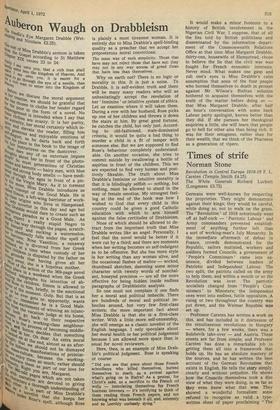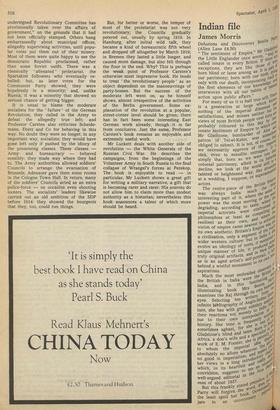Times of strife
Norman Stone
Revolution in Central Europe 1918-19 F. L. Carsten (Temple Smith £4.25) The White Generals Richard Luckett (Longrnans £3.75) Germans were well-known for respecting the proprieties. They might demonstrate against their kings; they would be careful, while doing so, not to walk on the grass. The ' Revolution ' of 1918 notoriously went off at half-cock — 'Patriotic Labour' and Army commanders prevented establishment of anything further left than a sort of working-man's July Monarchy. In the immediate aftermath of defeat in France, crowds demonstrated for the Republic, sailors mutinied, workers and soldiers formed Councils; a government of People's Commissars' came into existence, divided between leaders of Patriotic and Independent Labour. The two split; the patriots called on the army to help them; and within a month or so the Revolution was over. The patriotic socialists changed from ' People's Commissars' to Ministers; the independent ones went into endless, futile opposition. A rising or two throughout the country was put down, and the Weimar Republic was set up.
Professor Carsten has written a work on this, and has included in it discussion of the simultaneous revolutions in Hungary — where, for a few weeks, there was a Bolshevik take-over — and Austria. These events are far from simple; and Professor Carsten has done a remarkable job in getting them all into a framework that holds up. He has an absolute mastery of the sources, and he has written the best account of the German Revolution that exists in English. He tells the story simply, clearly and without prejudice. He shows how the Councils themselves took a dim view of what they were doing, in so far as they even knew what that was. They showed a wonderful formalism: some refused to recognise as valid a typewritten sheet of paper proclaiming "The undersigned Revolutionary Committee has provisionally taken over the affairs of government," on the grounds that it had not been officially stamped. Others hung embarrassedly about municipal offices, allegedly supervising activities, until popular votes put them out of their misery. Most of them were quite happy to see the democratic Republic proclaimed, rather than some Soviet outfit. There was a classically alienated' proletariat, the Spartakist followers who eventually rebelled; but, as later votes for the Communist Party showed, they were hopelessly in a minority; and, unlike Russia, it was a minority that showed no serious chance of getting bigger.
It is usual to blame the moderate socialists for the 'failure' of the German Revolution; they called in the Army to defeat the allegedly true left; and Professor Carsten also criticises Scheidemann, Ebert and Co for behaving in this way. No doubt they were no longer, in any important way, socialists; they would have gone left only if pushed by the idiocy of the possessing classes. These classes — Army and bureaucracy — behaved sensibly: they made way where they had to. The Army authorities allowed soldiers' Councils to arrange the evacuation of Brussels; Adenauer gave them some rooms in the Cologne Town Hall. In return, many of the soldiers' Councils acted as an extra police-force — on occasion even shooting looters. The socialists' leaders likewise carried out an old ambition of the SDP before 1914: they showed the bourgeois that they, too, could run things. But, for better or worse, the temper of most of the proletariat was not very revolutionary; the Councils gradually petered out, usually by spring 1919. In Hamburg, after initial wild talk, they became a kind of bureaucratic fifth wheel and dropped off altogether by March 1919; in Bremen they lasted a little longer, and caused more damage, but also fell through the floor in the end. Why? This is perhaps the weak point of Professor Carsten's otherwise most impressive book. He tends to treat 'the revolutionary people' as an object dependent on the manoeuvrings of party-bosses. But the success of the moderate left went on, as he himself shows, almost irrespective of the activities of the Berlin government. Some explanation of the revolution at a popular, street-corner level should be given; there has in fact been some interesting East German work already, though it is far from conclusive. Just the same, Professor Carsten's book remains an enjoyable and extremely useful work.
Mr Luckett deals with another side of revolution — the White Generals of the Russian Civil War. He describes the campaigns, from the beginnings of the Volunteer Army in South Russia to the final collapse of Wrangel's forces at Perekop. The book is enjoyable to read — in particular, Mr Luckett shows a great gift for writing a military narrative, a gift that is becoming rarer and rarer. His sources do not allow him to claim more than modest authority as a historian; nevertheless this book announces a talent of which more should be heard.



































 Previous page
Previous page